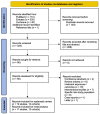Association between Dysphagia and Frailty in Older Adults: A Systematic Review and Meta-Analysis
- PMID: 35565784
- PMCID: PMC9105461
- DOI: 10.3390/nu14091812
Association between Dysphagia and Frailty in Older Adults: A Systematic Review and Meta-Analysis
Abstract
Background: Increasing bodies of epidemiological evidence indicate potential associations between dysphagia and the risk of frailty in older adults. We hypothesized that older adults with symptoms of dysphagia might have a higher prevalence of frailty or prefrailty than those without dysphagia.
Methods: We systematically searched the PubMed, Embase, and Cochrane Library databases for relevant studies published through 20 April 2022. Cross-sectional and longitudinal studies that examined the associations between dysphagia and the existence of frailty or prefrailty in community-dwelling, facility-dwelling, or hospitalized adults aged 50 years or older were synthesized. The Newcastle-Ottawa Scale was used to evaluate study quality.
Results: The meta-analysis comprised 12 cohorts, including 5,503,543 non-frailty participants and 735,303 cases of frailty or prefrailty. Random-effect meta-analysis demonstrated a significant association between dysphagia and the risk of frailty and prefrailty (OR, 3.24; 95% CI, 2.51-4.20). In addition, we observed consistent results across the subgroups and heterogeneity assessments.
Conclusions: We propose including dysphagia assessment as a critical factor in the cumulative deficit model for identifying frailty in older adults. Understanding dysphagia and the potential role of nutritional supplements in older adults may lead to improved strategies for preventing, delaying, or mitigating frailty.
Keywords: aging; deglutition; dysphagia; frailty; prefrailty.
Conflict of interest statement
The authors declare no conflict of interest.
Figures


References
Publication types
MeSH terms
Grants and funding
LinkOut - more resources
Full Text Sources
Medical
Miscellaneous

